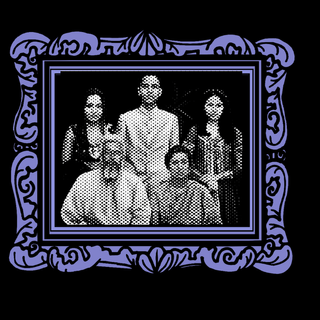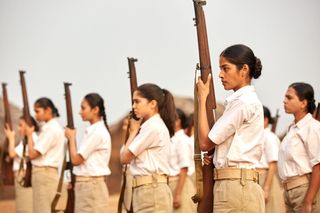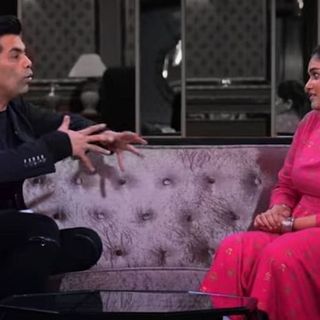
‘The Forgotten Army’ Glosses Over Fraught Relationship Between Feminism and the Military
The military doesn’t value all life equally — so how could it ever offer true equality?

Kabir Khan’s The Forgotten Army — Azaadi Ke Liye on Amazon Prime is one of the few television shows that portray women soldiers at the helm of India’s freedom struggle. Set in Singapore and Burma of the early 1940s, the five-part series takes the viewer through the making and eventual downfall of Netaji Subhas Chandra Bose’s Azad Hind Fauj (Indian National Army, or INA) — a 45,000-strong army mobilized abroad from British Army deserters, which tried to march to the Red Fort in New Delhi to reclaim the country from the British empire. A key element to the INA was the Rani of Jhansi regiment, one of the few all-women regiments in the Second World War.
The show glorifies these women soldiers, as young as 18 years old, who responded to Bose’s call enthusiastically, proving they’re as capable a soldier as the common man. In the context of fighting for independence, The Forgotten Army succeeds in portraying an empowered women’s armed force, undeterred by how its members were viewed by their fellow male soldiers, drawing on their own hardships under British rule, and using their anger to muster the courage to lay their lives down for the possibility of a free India.
More than 72 years after many women soldiers of the INA died fighting for independence, the Indian army has not inculcated women within its ranks. In September 2019, for example, the Indian Army announced it would commission its first-ever set of women soldiers to be allowed into combat by 2021 — a move lauded by most. Recently, however, advocates from the Centre government argued in the Supreme Court that women officers would be unfit for command posts, simply because male jawans wouldn’t accept their authority, The Swaddle reported. They backed up their argument by expressing concerns for women commanders’ ability to care for their children and also their suitability to fight on front lines. “Which exposes the Centre’s stance for the sexist obstruction to equality that it is, one with little merit and one that other countries have successfully and easily overcome,” Liesl Goecker wrote for The Swaddle.
To be sure, women’s participation in the military has been a coveted development in most countries of the world; it plays as an assurance from one of the most masculine institutions in society that, yes, women can do what men can. In The Forgotten Army,for example, Maya Srinivasan’s character (played by Sharvari Wagh and based on INA commander Janaki Thevar), convinces a fellow male soldier of her ability to be ladaku (a warrior), criticizing the perception that war is for hot-blooded men: If pushed to the edge, she claims, women — due to the sheer grit they’ve amassed by experiencing their mostly unique struggles, such as sexual violence — are hardwired to want to fight and win.
Looked at through the lens of feminism, however, advocating for, or glorifying, the inclusion of women soldiers within any military organization, especially by valuing their toughness borne out of patriarchal abuse, is inherently anti-feminist — during times of conflict or not. Virginia Woolf, on combat in times of war, addresses men in Three Guineas: “Obviously there is for you some glory, some necessity, some satisfaction in fighting which we have never felt or enjoyed,” adding, “If you insist upon fighting to protect me, or ‘our’ country, let it be understood, soberly and rationally between us, that you are fighting to gratify a sex instinct which I cannot share; to procure benefits which I have not shared and probably will not share …. For as a woman, I have no country. As a woman, I want no country. As a woman, my country is the whole world.” She unequivocally states, “to fight has always been the man’s habit, not the woman’s.”
Related on The Swaddle:
Sexual Violence as a Weapon of Conflict, Vigilanteeism on the Rise Globally
In the same text, Woolf does make faulty claims about women’s capabilities to fight, but she is correct in suggesting that the glory of fighting is inherently linked to male-ness, as a way to prove one’s masculinity and derive self-worth from it. Many feminists, then, have thought women deserve the same opportunity to derive a moral high ground and a sense of self-worth by being allowed to engage in combat; few, however, have dissected the need for combat at all, a concept taken as a given in a patriarchal society obsessed with rewarding masculine ideals.
Feminism, especially radical, norm-breaking feminism of present-day, shows women mustn’t only strive to do what men can do; the true meaning of feminism is also to envision a world bereft of patriarchy and male ideas of success and heroship. The role of feminism is not just to make women fit into the patriarchal mold of what should be lauded, but also, to change what is valued. Women’s inclusion in the military, even in non-combat positions, as a final frontier toward achieving equality, is faulty — it “makes the system subjugating us stronger and more difficult to fight. Our historical exclusion makes it [appear] desirable to achieve [inclusion] but that’s a lack of imagination. Our historical exclusion should push us to imagine a better system and another world that’s possible,” human rights attorney and assistant professor at George Mason University, Noura Erakat, told In These Times, adding the institution of the military was never created through a feminist framework, therefore it can never be feminist
This is apparent in the impact of war across the globe: conflict zones are stripped of basic necessities such as food and shelter; they become unsafe for women and other genders, most of the time at the hands of the military invading these areas; times of conflict also strip women of their careers, during which time they largely become caretakers for the sick and injured; not to mention the environmental impact of wars on (most developing countries’) ecosystems that leave scars for generations. None of these activities engaged in and encouraged by the military-industrial complex serve to benefit women, even if they do include women.
This is partly due to women being denied positions of power within these military institutions. They predominantly hold peacekeeping, medical or clerical roles, and are kept out of decision-making commander jobs that could alleviate the consequences of war. But history shows even when women hold this power, albeit not directly in combat forces, but at high-level positions within the military-industrial-political complex, things haven’t been much different: from women guards in Nazi concentration camps committing atrocities against prisoners, to former Prime Minister Indira Gandhi ordering the Indian Army to use heavy weaponry against Sikh activists and pilgrims, to Margaret Thatcher aiding or starting multiple wars to maintain Britain’s colonial power in Ireland. Women’s presence inside or in charge of violent institutions antithetical to the concept of human rights doesn’t necessarily chip away at the desire to achieve a masculinized ideal of sovereignty and power.
Including women in such institutions as a shortcut to seeming more progressive and acceptable reeks of an “add women and stir” approach, as coined by Kara Ellerby, author of No Shortcut to Change. “It’s a very white, imperialist, liberal understanding of feminism to think that the promotion of women at the top of militarization and militarism is advancing women,” she tells In These Times. “Sure, it’s great that you have a woman at the head of Raytheon [a U.S. weapons manufacturer], but what about the women who those bombs are being dropped on?”
Yes, military service is not only about dropping bombs and killing innocent people and chalking it up to collateral damage. For many women inside these military institutions, it might just be another job, one that has an added benefit of serving one’s own country. But the concept of a military, no matter what role one plays within it, is violent, harmful, and unfeminist. The need of the hour is not to make women fit into existing institutions that have, time and again, proven they don’t care about preserving the lives and liberties of all people; it is to dismantle them.
Rajvi Desai is The Swaddle's Culture Editor. After graduating from NYU as a Journalism and Politics major, she covered breaking news and politics in New York City, and dabbled in design and entertainment journalism. Back in the homeland, she's interested in tackling beauty, sports, politics and human rights in her gender-focused writing, while also co-managing The Swaddle Team's podcast, Respectfully Disagree.
Related


Karan Johar’s ‘What The Love?’ Forges Fairytales, Not Relationships or Wokeness — but That’s Fine
